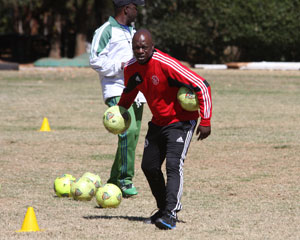
THE failure by the Zifa Football Association (Zifa) to implement the recommendations made by a committee that investigated the Asiagate scandal laid the foundation for match-fixers to return and haunt local football, one of the commissioners has said.
By Brian Nkiwane
Zifa has been criticised for prematurely lifting the bans imposed on local match-fixers, that included the association’s former chief executive officer, Henrietta Rushwaya.
Rushwaya has been accused of playing a leading role in the alleged manipulation of South African Premier Soccer League matches by Zimbabwean players plying their trade in the neighbouring country.
On October 11 2012, Zifa was given a 128-page report by the commission led by Justice Ahmed Ebrahim, which had carried out an extensive investigation of the match-fixing scandal that involved matches by the Warriors. Fifa refused to endorse the findings.
However, a member of the Ebrahim Commission yesterday said this could not have stopped Zifa from using the recommendations to clean up local football. He said it did not come as a surprise that Zimbabwe had been hit by another match-fixing scandal.
“We did everything that we could do,” said one member of the commission, “but guess what, they thought they would kill the cancer by threatening people. No, people have to face their own music,” the commissioner who requested anonymity said.
“If you look at the opening of the report, on page 1, it is clearly stated that this report was final and that there was no further inquiry. So whatever was in this report was final.” He said Zifa’s failure to impose deterrent sentences such as life bans was one of the reasons the match-fixers pounced on Zimbabwe for the second time.
- Chamisa under fire over US$120K donation
- Mavhunga puts DeMbare into Chibuku quarterfinals
- Pension funds bet on Cabora Bassa oilfields
- Councils defy govt fire tender directive
Keep Reading
“Why would people expect to cure the cancer without even having the bans effected?” he queried. “Fifa refused to endorse the bans for reasons best known to them, but was that going to stop those with dirty tricks from doing it again? No.
“That is the reason why we have the same old story unfolding now.”
The legal expert said it was also untrue that those caught up in the match-fixing scandal could not face criminal charges. “Match-fixers must not fool themselves thinking that there is no law that can nail those involved,” he said. “If you look at page 8 of the report, the commission stated clear offences that are associated with match-fixing and their possible penalties, so why would people turn back and say there is no law that nails the culprits?
“The reason is simple, even the new Zifa board did not take time to read the report, but has this done us any favour? No. They even had the guts to bring the Asiagate saga to a close.”
He said the Zifa constitution adequately dealt with match-fixing as a serious offence. Section 4, article 1 (c) of the Zifa constitution says: “An official of the association or club, match official or player shall not bet on any football match and clubs are also required to prevent betting and the use of objectional language.”
Article 54 says “natural and legal persons” can hand out a warning, a reprimand, a fine and the return of awards for those convicted of match fixing.
The sanctions may be imposed by the Zifa disciplinary committee.
Zifa, through the committee, has the powers to order an offending member to be suspended from football management, either permanently or for a certain period of time.
The Ebrahim Commission advised Zifa to align its rules and regulations with those of Fifa so that it could also be able to deal with supporters and other football-related persons caught dabbling in match-fixing.











